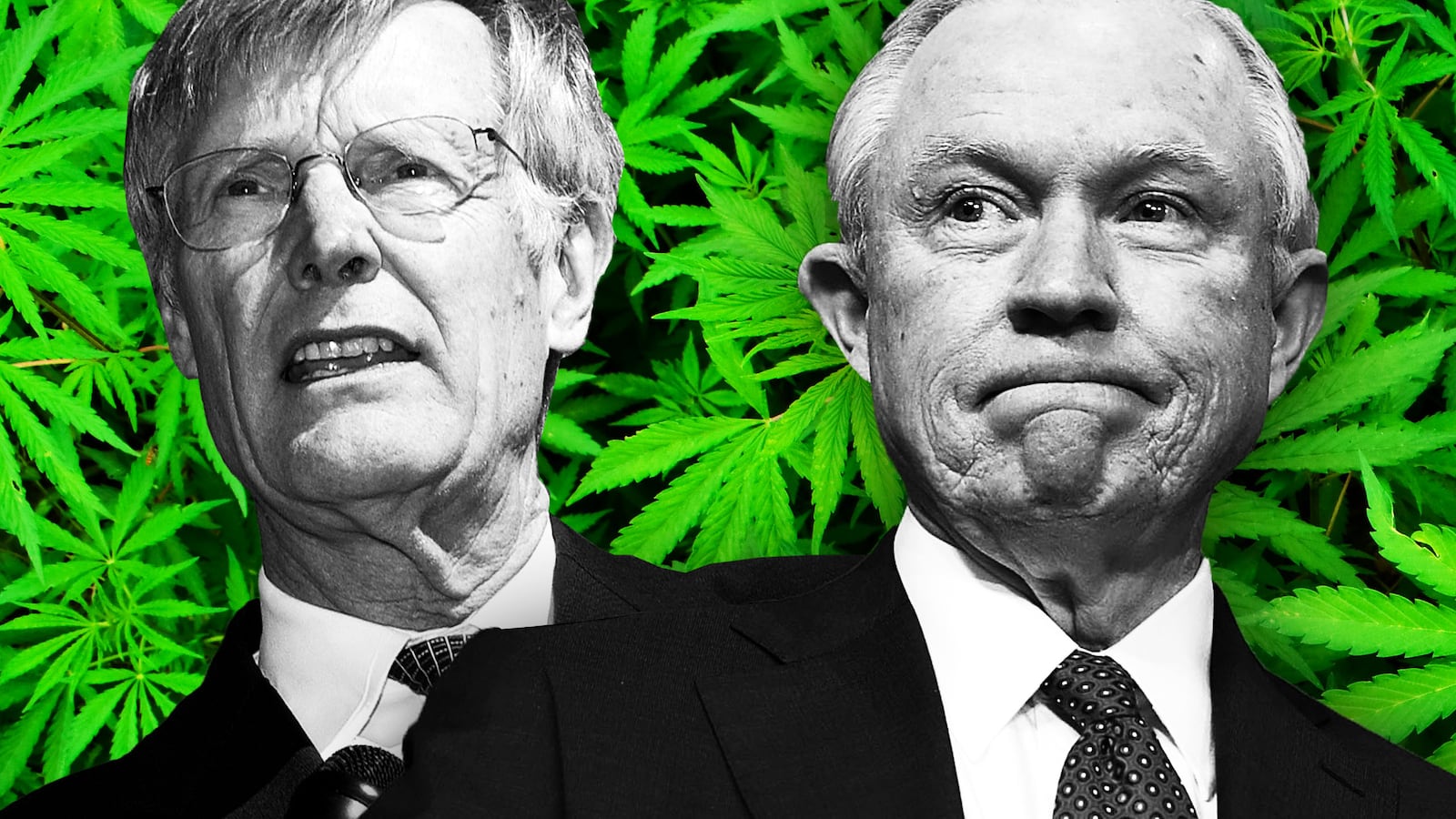A adviser on marijuana policy to Attorney General Jeff Sessions wants to see doctors make drug testing a routine part of primary-care medicine and force some users into treatment against their will, he told The Daily Beast.
Dr. Robert DuPont was among a small group of drug-policy experts invited to a closed-door meeting with Sessions last month to discuss federal options for dealing with the rapid liberalization of state marijuana laws. California became the sixth state to allow the sale of marijuana for recreational use on Jan. 1.
DuPont, 81, is one of the most influential drug warriors of the past century. He began his career as a liberal on drug control in the 1970s, calling then for the decriminalization of marijuana possession and launching the first U.S. methadone treatment program for heroin in Washington, D.C. in 1971. By the 1980s, he shifted to the right, popularizing the claim marijuana was a “gateway drug.”
At the December 2017 meeting with Sessions, DuPont was slated to present on “the effect of marijuana on drugged driving,” a topic on which he has proposed some radical ideas.
A national model bill he helped write in 2010 called on law enforcement to test anyone stopped for suspicion of driving under the influence for all controlled substances, and arresting them if any trace at all shows up in their system—regardless of the amount. While the bill includes an exemption for drivers who consumed a drug pursuant to a prescription, it would not apply to medicinal-marijuana users because doctors are not currently allowed to prescribe pot, only offer a recommendation for its use.
The bill’s language makes clear that these people will still face sanction even if they live in a state in which medical marijuana is legal.
“[The] fact that any person charged with violating this subsection is or was legally entitled to consume alcohol or to use a controlled substance, medication, drug, or other impairing substance, shall not constitute a defense against any charge,” it reads.
But even that’s not the worst of it.
The bill includes a section prohibiting the “Internal Possession of Chemical or Controlled Substances.”
“Any person who provides a bodily fluid sample containing any amount of a chemical or controlled substance... commits an offense punishable in the same manner as if the person otherwise possessed that substance,” it reads, adding in a footnote: “This provision is not a DUI specific law. Rather, it applies to any person who tests positive for chemical or controlled substances.”
Asked to comment on whether Sessions was aware of DuPont’s proposal to penalize drug users who may not even be under the influence behind the wheel, and if he supports it, a Justice Department spokesperson chose to focus on the dangers of driving while intoxicated.
"The Controlled Substances Act was enacted by Congress to comprehensively restrict and regulate numerous drugs, including marijuana,” said DOJ spokeswoman Lauren Ehrsam, in a statement provided to The Daily Beast. “Further, the attorney general agrees with the Centers for Disease Control that driving while impaired by marijuana is dangerous as it negatively affects a number of skills required for safe driving.”
On closer inspection, DuPont’s proposal is part of a plan to expand the use of drug-testing technology to root out users, and the threat of prosecution to compel them into treatment, where they will be tested even more.
Early last year, The Daily Beast conducted a lengthy interview with DuPont as he was shopping around a radical proposal —called the “New Paradigm for Long-Term Recovery”—to address America’s festering overdose crisis. It would include a massive expansion of drug testing in addiction medicine.
“Drug testing is the technology of addiction medicine, but it’s underutilized,” he said. “We want [drug screens] to be routine in all medicine. The health-care sector in general should approach addiction in the same way as diabetes, and that includes monitoring. Doctors already check for things like cholesterol and blood sugar. Why not test for illicit drugs?”
Calling his platform “the opposite of harm reduction,” DuPont said the goal of his plan is to promote “long-term results... and greater accountability” in the treatment sector.
Among other things, he proposed giving doctors the authority to compel suspected substance abusers into treatment against their will. Once in treatment, patients could face as much as five years of monitoring, including random drug tests.
“People don’t understand that referral to treatment is futile for an addict on their own,” DuPont told The Daily Beast. “Right now, the public really thinks that if we provide treatment the addicts will come and get well... that’s not true. So let’s use the leverage of the criminal-justice system, that’s what the programs in the New Paradigm want to do.”
DuPont presents his proposal as evidence-based, but it’s hard to separate his strong promotion of drug testing from his close personal and financial connections to the drug testing industry.
In the 1970s he was the nation’s drug czar under Nixon and Ford, and was the first Director of the National Institute on Drug Abuse, until his increasingly radical views (he called for drug testing all parolees and sending them back to prison if they failed) forced his resignation in 1978.
After leaving federal service, DuPont joined the former head of the Drug Enforcement Administration, Pete Bensinger, to cash in on urine testing. The firm they founded, Bensinger, DuPont & Associates, provided drug testing services to some of America’s largest corporations.
In 1991, while running the firm, DuPont introduced the idea of mandatory drug testing for welfare recipients in a policy document published by the Heritage Foundation. DuPont recommended “not only testing the adults on public assistance but also their children.”
Later that decade, DuPont co-authored research with the founder of a firm called Psychemedics promoting the company’s new hair testing technology.
In 2000, while he was a shareholder and a paid consultant for the company DuPont testified before a Food & Drug Administration panel on drug testing where he advocated for expanding hair testing into federal workplaces. Dismissing the appearance of a “conflict of interest” DuPont told the panel: “I don't think of myself as an employee or an advocate particularly for Psychemedics, but for drug testing generally.”
The FDA approved the company’s first hair follicle test two years later, and today Psychemedics is a multi-million dollar a year business that's in the process of a profitable expansion into South America.
This is a running theme for DuPont. For instance, Stephen Talpins, an attorney who helped DuPont author his model drugged driving bill, formerly was a vice president at Alcohol Monitoring Systems, Inc., which makes the SCRAM alcohol and location monitoring system used by many courts.
Now DuPont is listed as a scientific adviser on the website of global drug-testing startup called CAM International Ventures. That company was founded in 2013 by David Martin, former president of the Drug & Alcohol Testing Industry Association, and includes among its staff other prominent members of the drug testing industry.
Still, DuPont rejects the idea that there is any financial motivation behind his fixation drug testing.
“I find it bizarre to think that my interests after all these years were financial,” he told The Daily Beast. “I just think, there is a financial incentive in drug testing, but the reason I’m interested in drug testing is that there is an interest from the disease standpoint.”
With a dozen more states expected to consider legal marijuana measures in 2018, and even Republican lawmakers like Trey Gowdy questioning the federal government’s hard stance on the drug, it’s unlikely even a die hard anti-pot crusader like DuPont can turn back the tide, but that doesn’t mean he can’t make a few more bucks trying.






